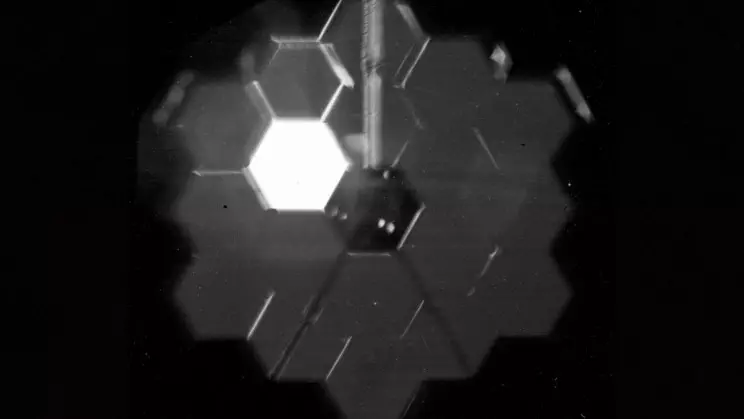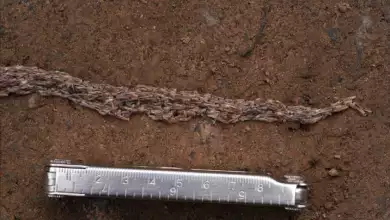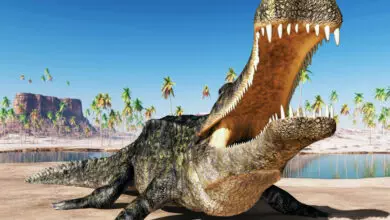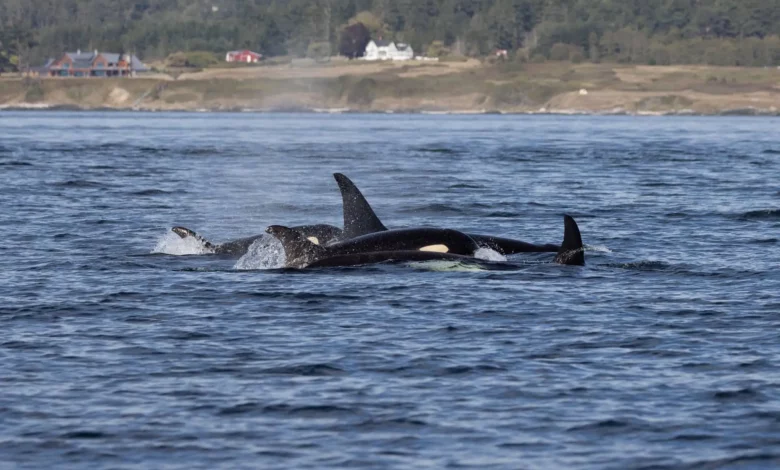
Researchers saw a horrifying sight in March 2019 off the coast of southwestern Australia: twelve orcas charging at one of the largest animals on the planet in an attempt to kill it. The adult blue whale perished an hour after the orcas ate enormous portions of its flanks. Though it was the first instance of orca-on-blue whale predation ever recorded, it wouldn’t be the last.
Recently, it has also been observed that orcas (Orcinus orca) are kidnapping young pilot whales and tearing open sharks so they can eat the livers. A small pod of orcas has also started to ram and sink boats off the coast of Portugal and Spain.
These incidents all demonstrate the extreme cunning of these apex predators.
According to Deborah Giles, an orca researcher at the University of Washington and the nonprofit Wild Orca, “These are animals with an incredibly complex and highly evolved brain,” Live Science reported. “They’ve got parts of their brain that are associated with memory and emotion that are significantly more developed than even in the human brain.”
Orcas are becoming more intelligent and are learning
However, given the scope and originality of these attacks, one may wonder if orcas are becoming more intelligent and are learning. If yes, what is the reason behind this change?
Josh McInnes, a marine ecologist at the University of British Columbia who studies orcas, said it’s unlikely that orcas’ brains are changing anatomically. According to McInnes, “anatomical change in an animal or a population can be influenced by behavioral change,” but only after thousands of years of evolution.
However, because orcas learn quickly, they can and will teach one another some gruesome tricks, making them “smarter” as a group. However, some of these seemingly novel techniques might be ancient habits that humans are only now beginning to record. Additionally, some of these taught behaviors develop into trends that fluctuate in social waves, just like in humans.
Orcas may acquire new behaviors due to frequent interactions with humans, such as boat traffic and fishing activities. Furthermore, orcas must adapt faster to changes in their environment and depend more on social learning to survive.
Related Article: Spacesuit Facts You Should Know
Orcas Learning Hunting Strategies
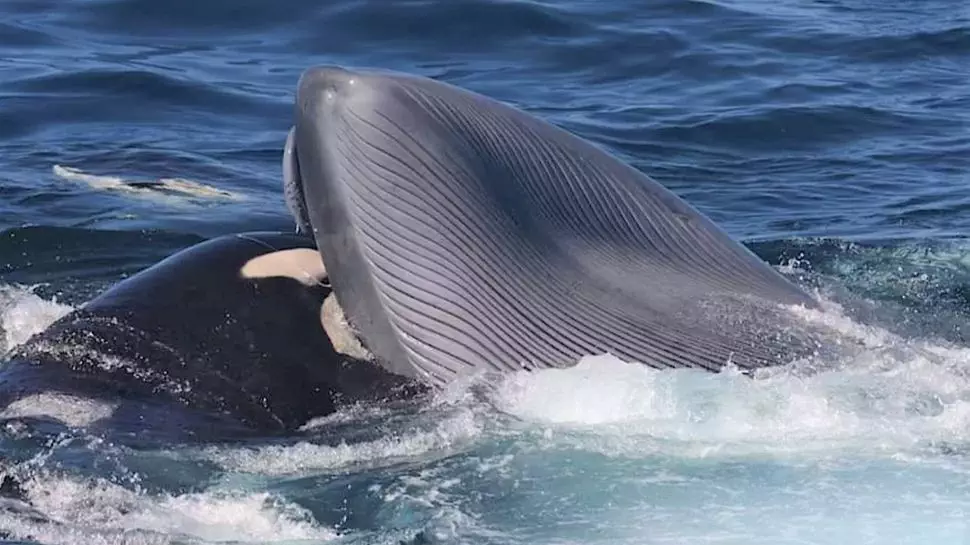
Without a doubt, orcas share knowledge with one another. As highly evolved apex predators, these animals impart and share many skills related to their role.
In a study released last year, scientists reported seeing orcas kill and consume blue whales (Balaenoptera musculus) for the first time. Following the initial attack in March 2019, two more incidents occurred in the months and years that followed. In both cases, orcas hunted down and submerged young blue whales, suffocating them.
According to Robert Pitman, a marine ecologist at Oregon State University’s Marine Mammal Institute, this newly observed hunting behavior is an example of social learning, with adult orcas sharing and passing on strategies to their young via email. He said that the dominant female in a pod will pass on to her offspring “anything the adults learn.”
Blue whale hunting “requires cooperation and coordination,” according to Pitman. It’s possible that orcas developed the expertise necessary to take on such massive prey in response to whale populations recovering from whaling. According to Pitman, this knowledge was then passed down until the orcas developed a high level of skill at hunting even the largest animal on Earth.
Related Article: Famous monuments influenced by Roman architecture
Orcas learning old tricks and new observations

Some of the graphic behaviors that researchers have recently seen may be ingrained habits.
For example, witnesses to the blue whale attacks saw orcas sticking their heads inside the mouths of the living whales in order to feed on their tongues. However, it’s likely not a novel behavior; rather, it’s just that people are now able to observe it up close.
“Killer whales are like humans in that they have their ‘preferred cuts of meat,'” Pitman stated. “When preying on large whales, they almost always take the tongue first, and sometimes that is all they will feed on.”
Orcas pursue other delicacies besides tongue. Two men known only as Port and Starboard have been killing sharks off the coast of South Africa for several years to remove their livers.
Michael Weiss, a behavioral ecologist and research director at the Center for Whale Research in Washington State, told Live Science that while the behavior initially shocked researchers, it’s unlikely that orcas recently learned to eat liver as a result of social learning.
Related: A shredded carcass suggests that orcas attacked a great white shark in Australia so they could feast on its liver.
This is due to the fact that this year, off the Mexican coast of Baja California, scientists were also able to film orcas gorging on the liver of a whale shark. Since it is improbable that Port and Starboard could have transmitted their knowledge over thousands of miles of ocean, liver-eating is most likely a common and accepted practice.
“Because there are more cameras and more boats, we’re starting to see these behaviors that we hadn’t seen before,” Weiss said.
Related Article: Underwater cities: seven facts you should know
Sharing scavenging techniques

More than hunting techniques are learned and shared by orcas. Many populations across the globe have acquired the skill of pilfering fish intended for human consumption from longlines utilized in commercial fisheries, and they have disseminated this knowledge.
Since the 1990s, when fishing in the area increased, two populations of orcas in the southern Indian Ocean, near the Crozet Islands, have become more adept at scavenging off longlines. By 2018, every orca in these waters had learned to gorge themselves on longline buffets, and entire pods that had only eaten seals and penguins were now craving human-caught toothfish.
Orcas can pick up new behaviors fast, but sometimes that can be deadly. Orcas have just lately begun to eat groundfish that bottom trawlers in Alaska catch, yet many of them become entangled in fishing gear and die from it.
“This behavior may be being shared between individuals, and that’s maybe why we’re seeing an increase in some of these mortality events,” McInnes stated.
Related Article: The Iron Dome: What Is It and How Effective It’s
Playing macabre games

The remarkable cognitive powers of orcas are not limited to play.
Off the coast of the North Pacific, Giles and her colleagues research an endangered species of salmon-eating orcas. These killer whales, known as the Southern Resident population, do not consume animals. However, during the previous 60 years, they have created a peculiar pastime in which they search for baby porpoises and play with them until they die, sometimes even with the umbilical cords still connected.
According to Giles, there are 78 reported instances of these orcas kicking or throwing porpoises to each other like a ball, but there isn’t a single instance of their gobbling on the small mammals. “In some cases, you’ll see teeth marks where the [killer] whale was clearly gently holding the animal, but the animal was trying to swim away, so it’s scraping the skin.”
Because salmon are around the same size as newborn porpoises, the researchers believe that these games may teach young orcas how to hunt. “Sometimes they’ll let the porpoise swim off, pause, and then go after it,” said Giles.
Are humans driving orcas to learn “becoming smarter”?
According to McInnes, human activity may be indirectly contributing to orcas’ increased intelligence through altered ocean circumstances. For example, orca raids on longlines and trawl fisheries demonstrate how they adapt to human presence in the water by inventing new techniques.
Moreover, orcas may have to rely more on one another for learning due to climatic changes brought on by humans.
For example, a colony of orcas in Antarctica usually washes Weddell seals (Leptonychotes weddellii) off ice floes. However, as the ice melts, they are changing their hunting strategies to target leopard seals (Hydrurga leptonyx) and crabeater seals (Lobodon carcinophaga), two species that are “a little bit more feisty” and don’t rely as heavily on ice floes, meaning that orcas will need to pick up new abilities, according to McInnes.
Although human actions can help orcas learn new things, sometimes they have also weakened the relationships that underlie social learning. For example, overfishing of salmon off the coast of Washington has destroyed the social cohesion that maintains orca populations.
“Their social bonds get weaker because you can’t be in a big partying killer whale group if you’re all hungry and trying to search for food,” Weiss stated. According to Weiss, as orca groups split up and get smaller, so does their ability to share knowledge and adjust to their ever-changing environment.
Orcas are “acutely aware that humans are there,” according to McInnes, even though it’s unlikely that they are aware that humans are to blame for changes in their ocean habitat.
Fortunately for us, he continued, orcas don’t appear to be interested in honing their lethal techniques on humans.

